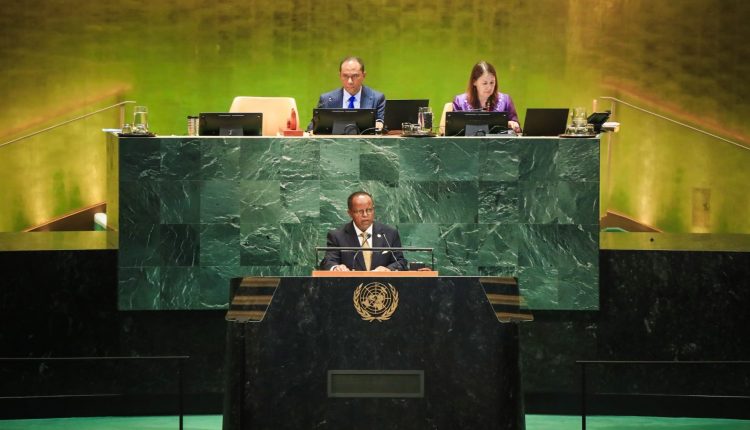No country should be locked out of opportunities due to geography, says Ethiopia’s President
Addis Ababa, September 25, 2025 (FMC) – President Taye Atske-Selassie emphasized Ethiopia’s pursuit of equitable access and fair utilization of the Red Sea and Indian Ocean, highlighting their strategic importance for trade, regional development, and security.
“No state should be locked out of opportunities for growth, finance, and technology due to geographical circumstances,” President Taye told world leaders, underscoring Ethiopia’s commitment to ensuring fair maritime access.
Speaking at the 80th session of the United Nations General Assembly in New York on Thursday, the President noted that Ethiopia, with Africa’s second-largest population and significant maritime trade interests, places high importance on the safety and security of navigation in the Red Sea and the Indian Ocean.
He emphasized that the international law maxim defining the high seas as a common heritage of mankind must be realized to guarantee equal rights of access and use for all states.
President Taye referenced UN Secretary-General António Guterres’ statement at the Third UN Conference on Landlocked Developing Countries (LLDC3) in Awaza, Turkmenistan, early last month, noting that the Secretary-General emphasized: “Geography should never define destiny.”
The Ethiopian head of state said his country aligns with this call, underlining Addis Ababa’s pursuit of fair access to maritime routes and global opportunities despite its landlocked status.
Highlighting the broader regional dimension, President Taye linked Ethiopia’s maritime objectives to national and regional development projects such as the Grand Ethiopian Renaissance Dam (GERD) and the Nile River Basin Cooperative Framework, which foster energy generation, regional connectivity, and shared prosperity among Nile riparian countries.
He said these initiatives reflect Ethiopia’s vision for African agency and Pan-African cooperation, aimed at breaking the cycle of underdevelopment and improving the livelihoods of millions.
The President underscored that Ethiopia will continue advancing its maritime policy through diplomacy and peaceful engagement, pursuing a comprehensive approach to ensure equitable development and security along the Red Sea and Indian Ocean.
He added that this commitment is aligned with Ethiopia’s broader principle that national and regional security are indivisible and interdependent, and that cooperation is essential for lasting stability.
Concluding his remarks, President Taye reaffirmed Ethiopia’s dedication to multilateralism, collective security, and sustainable development under the UN Charter, stressing that ensuring fair maritime access is vital for economic growth, regional integration, and long-term stability.

